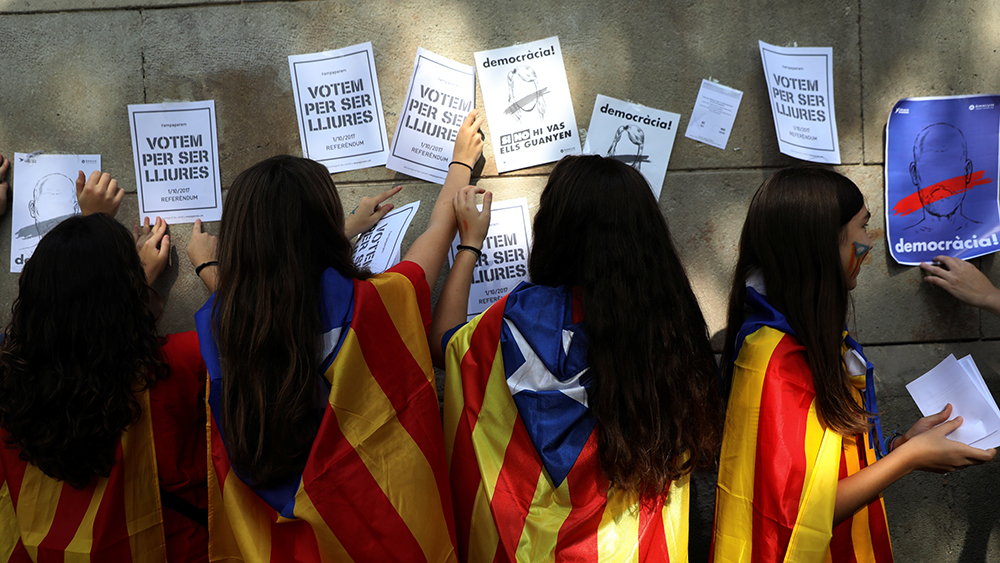Catalonia is barreling toward a referendum on independence from Spain this Sunday, even though Madrid has barred the vote from taking place. With tensions rising and protests growing, neither side seems willing to budge.
Last week, Catalans awoke to news that Spain’s national military police had raided the regional government’s facilities, from the economy department to that responsible for external affairs and even the presidency’s offices. They combed the Generalitat, the political institution that governs the autonomous region, detaining the regional junior economy minister and 13 other officials on charges of disobedience and embezzlement – all for organizing the independence referendum to be held in Catalonia on Sunday.
The Civil Guard also confiscated ten million paper ballots, shuttered websites promoting or facilitating the vote, and seized control of the region’s finances, effectively decimating Catalonia’s logistical capacity to organize the referendum. Yet if the Spanish government intended to quell dissent, it has done just the opposite: for more than a week, protesters have taken to the streets of Barcelona, waving Catalonian flags and demanding the release of government officials and an end to what they deem a “state of exception.”
The Spanish government, led by Prime Minister Mariano Rajoy and his conservative People’s Party (PP), argue the “in” or “out” vote is illegal because it challenges the country’s constitution, which clearly protects Spain’s territorial unity. Catalan President Carles Puigdemont, however, ready to defy Madrid, has repeatedly said that there will be a “legitimate vote” on Sunday, even if the requirements needed to make the result binding – a public campaign for both yes and no votes, registered electoral polling stations, a reliable census – are not in place. The standoff is increasingly turning into a high-stakes game of chess, with both sides gunning for checkmate.
The Road to Referendum
Catalonia is not simply a self-governing region, with its own culture, language, and a deep-rooted pride. It is also one of Spain’s wealthiest regions, generating around 20 percent of the country’s GDP and around 25 percent of foreign trade. If Catalonia were to break away, it would leave a gaping hole in the Spanish economy.
The drive for independence was a fringe movement in the 1990s. But it gained steam over the following decade, inflamed by the conservative People’s Party (PP) and its attempts to tighten the screws on autonomy. In 2005, Catalan nationalists in the Generalitat parliament drafted and approved the Estatut, a new charter that expanded upon Catalonia’s self-governance. Voters approved the new framework in a referendum.
But the PP appealed, arguing that Catalonia was being granted too much privilege. That set the stage for 2010, when the constitutional court – responding to the PP’s appeal – rejected parts of the charter that outlined greater autonomy.
Meanwhile the eurozone debt crisis fanned the flames. The Catalan nationalist party, forced to implement spending cuts, blamed the Spanish government for crippling the wealthy region, pointing to the staggering taxes it had to pay to the Spanish government to keep Spain’s struggling economy afloat. That bolstered independence fervor in the region, and in the next Catalan elections, three separatist parties won 47 percent of the vote – and more than half the seats in parliament. With their majority, they adopted a declaration of sovereignty, setting the course for a referendum. The constitutional court ruled it unconstitutional.
Going to Court
Spain’s government has long turned to its courts to achieve what it has been unable to politically. After the eurozone debt crisis, for example, Catalonia implemented measures to protect families from foreclosure and maintain their basic services like electricity and gas. The constitutional court rejected those mechanisms. It repealed elements of the Catalan Equality Law that granted more rights to trade unions and women, and overturned an initiative blocking fracking in Catalonia. These were cases, according to the court, where the Generalitat had overstepped its boundaries as a self-governing region. But the rulings only served to whip up more anger in Catalonia.
“These types of reactions have shown that there are many state structures that did not really modernize after the transition to democracy” [from the Fascist Franco dictatorship in 1978], said Xavier Giró, a professor of political journalism at the Autonomous University of Barcelona (UAB), adding that both the People’s Party and the judiciary were exhibiting undemocratic behavior. “The fact that 80 percent of Catalans say they want a referendum is a demand for political self-determination, regardless if the vote is yes or no, and you cannot ignore it,” he said.
On a national level, the left-wing Podemos party and a coalition of smaller nationalist parties that together make up a third of the Spanish parliament favor a referendum in Catalonia that would mirror the independence votes in Scotland and Quebec. They have urged the PSOE, the social democrats, to join forces, but poor election results and internal squabbles have rendered the PSOE silent. The European Union, too, has remained largely quiet on what it considers an internal question facing one of its member states.
Even though a large majority of Catalans supports a referendum, the polls show that the independence vote would actually lose. Even so, tensions are running high. If Spanish police block polling stations this coming Sunday, the voices of the #Notenimpor (“We’re not scared”) and #Votarem (“We will vote”) will only be magnified.







